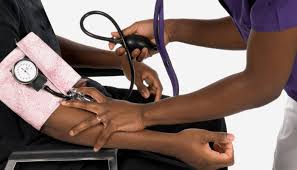
Half of Nigerians with hypertension are not receiving therapy - Physicians
Due to poverty and the high expense of medications, doctors have expressed concern that more than 35% of Nigerian adults with hypertension are not receiving therapy.
The doctors voiced concern about the increasing number of issues related to hypertension they are seeing as a result of patients' inability to pay for their prescription drugs.
According to the World Health Organization, hypertension, often known as high blood pressure, occurs when a person's blood vessel pressure is very high (140/90 mmHg or greater).
It goes on to say that while hypertension is common, it can become serious if left untreated. Some risk factors include aging, heredity, being overweight or obese, not exercising, eating a high-salt diet, and drinking too much alcohol.
According to the WHO, hypertension can result in heart attacks, heart failures, strokes, sudden death, kidney damage, and kidney failure, among other consequences.
Experts note that while there is no cure for hypertension, it can be managed with medicine and lifestyle changes.
According to the WHO, 1.28 billion adults between the ages of 30 and 79 globally suffer with hypertension, with two-thirds of those individuals living in low- and middle-income nations.
According to data from the Nigerian Hypertension Society, the prevalence in Nigeria's adult population is between 38 and 42 percent, which is considered extremely high.
Doctors claim that extremely high blood pressure can induce headaches, blurred vision, chest pain, and other symptoms, even though the majority of people with hypertension do not have any symptoms.
They pointed out that routine blood pressure checks are still the most effective method of determining whether or not a person has hypertension.
The doctors added that they were concerned that many Nigerians with hypertension were not aware of their condition, cautioning that if left untreated, hypertension can lead to other illnesses like renal disease, heart disease, and stroke.
They claim that depending on the conditions that cause it, hypertension can be classified as either primary or essential hypertension or secondary hypertension.
Dr. Babawale Bello, a consultant nephrologist at the Lagos University Teaching Hospital in Idi-Araba, informed our correspondent that the nation's economic woes had made hypertension and its related consequences more prevalent.
Due to the high cost of medications, many Nigerians with hypertension are no longer taking them, and even those who are are not taking them regularly because of the expense, according to the Associate Professor of Medicine at the College of Medicine, University of Lagos.
However, the nephrologist stated that the fact that many Nigerians with the silent killer ailment are unaware that they have it is a special concern for the doctors.
He revealed that it is extremely risky for someone with high blood pressure to be unaware of it, as it may result in unexpected death.
"We are concerned that half of Nigerians with hypertension are unaware that they have it," Bello said. Just half of those who are aware are receiving therapy, and of those who are taking treatment, only half are controlled.
“For us as a people, it is even worse now because of the rising cost of care. So, discuss with your doctor if you have challenges buying the medicine he has prescribed. There are always cheaper alternatives he can prescribe.”
He said though data on the number of Nigerians living with hypertension differs, evidence suggests that statistics are alarming.
“There is evidence to suggest that the proportion varies from region to region, and urban compared to rural areas. But on the average, the population of Nigerians living with hypertension will be between 20 per cent to 30 per cent in rural areas, and then closer to 35 per cent in urban areas”, he said.
He affirmed that many people with high blood pressure may bring their blood pressure down to a healthy range by changing their lifestyles, and he recommended those who have hypertension to exercise frequently and eat a nutritious diet.
According to Professor Ayodele Omotoso, president of the Nigerian Hypertension Society, primary hypertension accounts for 90–95% of all occurrences of hypertension, with secondary hypertension accounting for the remaining 5%.
According to him, the prevalence of hypertension has risen both in Nigeria and throughout the world, with low-middle-income nations—particularly those in sub-Saharan Africa—seeing the fastest rate of increase. In Nigeria, the prevalence among adults is between 38 and 42 percent.
The don bemoaned the fact that some patients are now unable to pay for their prescription meds due to rising drug costs.
Omotoso, a physician cardiologist at the University of Ilorin Teaching Hospital in Kwara State, confirmed that the price of many drugs had increased, with some estimates indicating a 200–300% increase in the last 12 months.
He continued, "I recently dealt with a patient who requested that his prescriptions be changed—not because they were not functioning, but because he was unable to pay for them. About two weeks ago, the same medication that he was taking for N2,500 a month was now costing N22,000 per month.
Then consider a situation where you are asking a person earning N30,000, the minimum wage, to take one of the many medications that they will be on for N22,000; the patient will not take the medication.”
The doctor voiced concern that because medications are so expensive, Nigerians with hypertension may turn to homemade remedies.
Patients will be forced to start searching for what they believe to be less expensive alternatives, such as herbal teas and native concoctions, and if none of those are proven to be effective, they may cause problems.
Because the patients cannot afford the meds, he continued, "one of the sad dangers is that we will be seeing more and more of the problems of hypertension."
He urged Nigerians who have been diagnosed with the illness to take their drugs as prescribed and encouraged them to embrace routine health checks.





